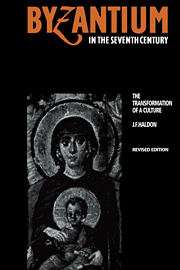Book contents
- Frontmatter
- Contents
- List of plates
- List of maps
- Preface and acknowledgements
- Preface to the revised edition
- List of abbreviations
- The sources
- Introduction
- 1 The background: state and society before Heraclius
- 2 The East Roman world c. 610–717: the politics of survival
- 3 Social relations and the economy: the cities and the land
- 4 Social relations and the economy: rural society
- 5 The state and its apparatus: fiscal administration
- 6 The state and its apparatus: military administration
- 7 Society, state and law
- 8 The imperial church and the politics of authority
- 9 Religion and belief
- 10 Forms of social and cultural organisation: infrastructures and hierarchies
- 11 Forms of representation: language, literature and the icon
- Conclusion: The transformation of a culture
- Addendum: Further observations on the question of the late ancient city
- Bibliography
- Index
2 - The East Roman world c. 610–717: the politics of survival
Published online by Cambridge University Press: 13 November 2009
- Frontmatter
- Contents
- List of plates
- List of maps
- Preface and acknowledgements
- Preface to the revised edition
- List of abbreviations
- The sources
- Introduction
- 1 The background: state and society before Heraclius
- 2 The East Roman world c. 610–717: the politics of survival
- 3 Social relations and the economy: the cities and the land
- 4 Social relations and the economy: rural society
- 5 The state and its apparatus: fiscal administration
- 6 The state and its apparatus: military administration
- 7 Society, state and law
- 8 The imperial church and the politics of authority
- 9 Religion and belief
- 10 Forms of social and cultural organisation: infrastructures and hierarchies
- 11 Forms of representation: language, literature and the icon
- Conclusion: The transformation of a culture
- Addendum: Further observations on the question of the late ancient city
- Bibliography
- Index
Summary
HERACLIUS 610–641
The reign of the ‘tyrant’ Phocas demonstrates the degree to which the Justinianic expansion of the sixth century had over-extended the resources of the state, and how crucial the stability of the central authority was to the well-being of the empire as a whole. Phocas, a subordinate officer from the Danube forces, seems to have had neither the ability nor the experience needed of a ruler in the situation in which the late Roman state found itself. His reign is remarkable chiefly for the plots and attempts on his life which he managed to avoid during the eight years of his reign in Constantinople, and for the disastrous collapse of the empire's defences, especially in the East. A long series of unsuccessful, senate-inspired plots eventually culminated in the expedition sent by Heraclius the Elder, the exarch of Africa based at Carthage, under his son Heraclius and his nephew Nicetas; the former with a squadron of ships with Byzantine and Moorish troops to Constantinople, the latter marching in 608 via Egypt, which quickly joined the rebellion. Heraclius with his fleet appeared off Constantinople on 3 October in the year 610; he had been greeted enthusiastically en route wherever he had stopped; and the story was repeated at Constantinople. Phocas' supporters deserted him, Heraclius was let into the city, and the tyrant was executed. His last words testify both to the situation of the empire after eight years of directionless government, and to Phocas' own desperate incompetence.
- Type
- Chapter
- Information
- Byzantium in the Seventh CenturyThe Transformation of a Culture, pp. 41 - 91Publisher: Cambridge University PressPrint publication year: 1990



